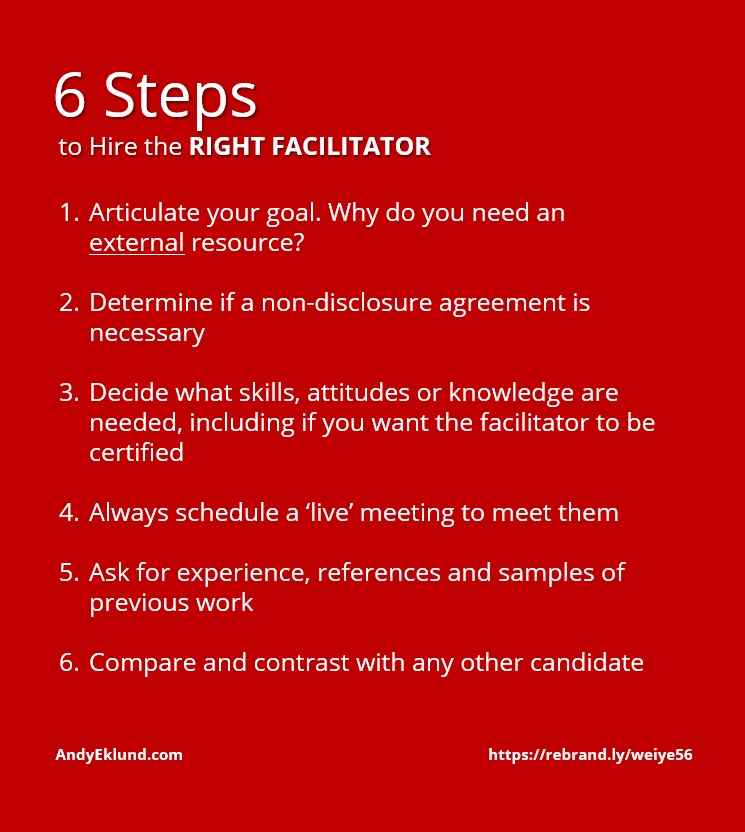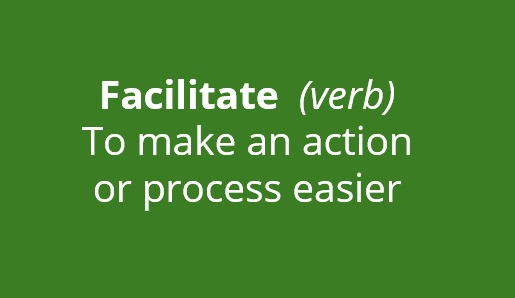If you’ve decided that hiring an external meeting or brainstorm facilitator is your best option, here are some recommendations and tips to find the right facilitator for your project or task, including the point-of-view of someone’s been hired to run meetings many times in the past.
1. Articulate your objectives or goals of hiring a facilitator.
The first question is why do you need a facilitator?
What about the propsed meeting do you feel it would be beneficial – or even necessary – to hire a facilitator?
What specific goal are you trying to accomplish that you feel you need an external resource?
Internally, start with being explicit about why. Your objectives are imperative for the facilitator to understand to decide whether they …
- Are the right match for the job
- Have the skill set or background to conduct the meeting
- Can effectively educate themselves on your organisation’s situation or background in a reasonable amount of time to be able to intelligently facilitate the meeting without slowing the meeting down
- Have the necessary time to complete the assignment
Also, good facilitators pass along your request to other good facilitators if they can’t help. If one of your candidates can’t – or worse, won’t – recommend a colleague to you if they’re not available, they aren’t the type of facilitator you want to hire in the first place.
2. Determine if you need the facilitator sign a non-disclosure agreement or similar document.
Depending upon the meeting, attendees and information to be discussed, will your organisation demand a non-disclosure agreement (NDA) to be signed in advance?
It’s often the first question I ask a new client because I already have my own clients, and one of them may be a competitor. For both respect and clarity, I need to know what legally will be required of me.
Frankly, if I have non-competing clients who are both asking me to brainstorm the same issue, I bring that up with both clients for their approval.
More so, depending upon the client and the project, sometimes I may need to bring my own IP to the meeting. Look at your current NDA to know whether the facilitator can protect their own IP, just like you want to do with your own property and information.
3. Determine the specific skills, attitudes or knowledge are need from the facilitator.
Like the previous point about objectives, decide first what specific skills, attitudes or experience you need to hire the right facilitator.
If you don’t know precisely what you need, here are two posts with a short list of usual tasks performed by a facilitator.
Go here or here to adapt and add your own needs to create a unique list for your organisation.
Or, here is a good external article on the essential facilitatioin skills.
At the same time, decide if you need the facilitator to be certified.
Is certification necessary? No. I used to lead one of the biggest facilitation pools for a training company in Australia, and very few – literally a handful – had certification. To be truthful, I was far more interested in actual work experience than a paper certification.
Does it help? That depends upon who is doing the certification. There are many good organisations who certify facilitators. Those who are legitimate have a rigorous level of standards and benchmarks used to check certification, and some of these critieria may be useful to you to find the right facilitator to match your organisation.
Above all else, ask questions about …
- What did certification give to you (the facilitator) or to their clients? (One possible answer: credibility.)
- What did it take to become certified?
- How long does the certification last?
Finally, and this is not meant to be a judgment, but in my opinion the one specific difference you’ll find between certified and non-certifie facilitators is one has a higher daily billing rate.
Speaking of budgets, you should also get a detailed estimate on all expenses from the facilitator, not just a hourly or daily rate, such as mileage if they have to drive to your location, nearby parking, or tax/GST,
4. Set up a meeting so you can interview them in person.
‘In person’ simply means you want to see them in real time. Live is best. Zoom or similar is a good second option. Do not interview only by phone.
Part of the reason you are interviewing them live is to get a sense of the energy they’d bring to the meeting itself. In fact, it’s a good question to ask a facilitator: Where do you get your sense of energy to conduct a half-day or full-day workshop?
5. Ask for experience, references and samples of previous work.
Like any job interview, to find the right facilitator you need to ask for copies of references (even better, if from a similar industry to yours). You should ask about recent clients, assignments. Enquire how they keep ‘up to date.’ Ask if they have a non-competitive clients which may have similar objectives or outcomes.
Whenever I go for an interview, I bring copies of previous agendas. I like to bring examples of meeting exercises, such as specific work tools, such as conducting a root-cause analysis, or exercises that simply energise during a long meeting.
6. Interview at least two candidates.
Let’s not over-complicate this. If you find a great facilitator and you’re comfortable with him/her – then by all means, Go with God.
But, if you’ve never hired a facilitator, much less spoke to one independently of a meeting they’re running, you may want to interview at least two candidates. If you only meet one, you don’t know whether they’re good or not. You only know if they’re right for you by comparing and contrasting one against the other. Just be clear, honest and transparent to both candidates. Also, make sure too you have a proper list of criteria to judge the candidates. Don’t make an emotional decision.
One last consideration. Don’t go through sales staff or an ‘agent.’
Be careful if you go through a training or facilitation company to find an individual facilitator. It’s my experience that the salespeople at training and facilitation companies often don’t know the depth of their own talent. (They work on commission, often via their internal relationship with individual facilitators. In other words, you get their favourite facilitator, not necessarily the right facilitator for you.)
You also pay a premium on the facilitator through an agent. It’s far easier and simpler to go through the facilitator directly as most good facilitators already have an online presense.
Finally, one last external post which you may find useful: Facilitation Matter by Mike Press.
Any other steps or considerations you’ve used to find the right facilitator? Please add your thoughts and comments below.



No comment yet, add your voice below!